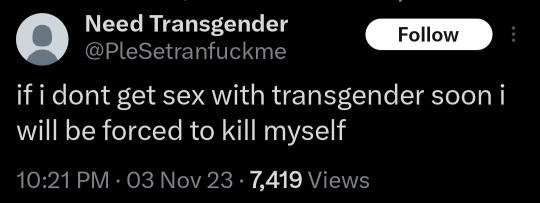#trans or suicide
Text
By: Mary Harrington
Published: Feb 19, 2024
A new study challenges the common assertion that gender-dysphoric youth are at elevated risk of suicide if not treated with “gender affirming” medical interventions. If it’s true, it ought to have a seismic impact on the accepted medical approach to gender-confused youth.
Reported in the BMJ, the study examines data on a Finnish cohort of gender-referred adolescents between 1996 and 2019, and compares their rates of all-cause and suicide mortality against a control group. While suicide rates in the gender-referred group studied were higher than in the control group, the difference was not large: 0.3% versus 0.1%. And — importantly — this difference disappeared when the two groups were controlled for mental health issues severe enough to require specialist psychiatric help.
In other words: while transgender identity does seem to be associated with elevated suicide risk, the link is not very strong. What’s more, the causality may not work the way activists claim.
The association between gender dysphoria and mental illness is well-documented by both providers of “gender-affirming care” and trans advocacy groups and clinical psychology research. But one less well-evidenced claim, based on this association, is that these difficulties are caused not by being transgender, but by the political and social stigma associated with it. Gender dysphoria, we are to understand, is not in itself a mental health issue. What causes mental health issues in transgender youth — up to and including suicide — is the wider world’s rejection of their identity, and of the metaphysical frame of “gender identity” as such.
This is the root of the oft-repeated social media assertion that anyone who demurs about trans identity, however mildly, is complicit in “trans genocide”. The same assertion that invalidating trans youth makes them kill themselves is also behind the rhetorical question routinely used to browbeat parents into consenting to social and medical transition for their gender-confused offspring: “Would you rather have a live daughter or a dead son?”
It’s behind the prohibition on “trans conversion therapy” already in force in several countries, and promised by the Labour Party in England too. Such measures forbid therapists from exploring with their clients whether there is any link between their gender dysphoria and — for example — life trauma or other mental health issues. For logically, if the cause of distress and suicidality in trans people is not being accepted for who they are, any therapist who seeks to explore links between gender dysphoria and other biographic or psychiatric issues is complicit in just this kind of non-acceptance, and is thus not helping but harming their client.
But as the study puts it: “Clinical gender dysphoria does not appear to be predictive of all-cause nor suicide mortality when psychiatric treatment history is accounted for.” Rather, what predicts risk in this population is “psychiatric morbidity”. And contra the activists, transitioning does nothing to reduce it: “medical gender reassignment does not have an impact on suicide risk.”
Every suicide is a tragedy, and leaves grieving loved ones behind. No one wants to be complicit in pushing a young person down that path. So the suggestion that questioning someone’s gender beliefs may have this effect serves as a powerful emotional cudgel. But if the Finnish study is correct, this whole rhetorical, legislative, and medical edifice may be built on sand. If the elevated risk of suicidality in trans youth disappears when you control for other psychiatric difficulties, this suggests strongly that trans youth are not more at risk due to transphobia or invalidation, but due to the well-documented fact that gender dysphoria tends to occur in people who are disturbed and unhappy more generally.
It ought to follow from this that the way to manage suicide risk in trans-identified young people is not to affirm their gender identity and whisk them off for medical interventions, but to watch for and treat psychiatric comorbidities. Ultimately, though, the claims of gender ideology are less scientific than metaphysical. So don’t expect scientific evidence that contradicts its prescriptions to have much impact on trans advocates. Even if “following the science” would make a real difference to suicide risk in gender-dysphoric youth.
==
History will view "gender affirming care" advocates the same way we view lobotomy advocates.
#Mary Harrington#affirm or suicide#suicide narrative#trans or suicide#suicide#gender affirming care#gender affirming healthcare#gender affirmation#affirmation model#medical corruption#medical scandal#medical malpractice#gender lobotomy#pseudoscience#medical experimentation#religion is a mental illness
197 notes
·
View notes
Text
When I was a very suicidal trans activist in Texas, Benjamin Sisko saying “sure, you would [die for your people]. Dying gets you off the hook. The question is: are you willing to live for your people?” changed and possibly saved my life. It’s up there with “if we are going to be damned, let us be damned for who we really are” from Picard. Star Trek not only shows us a better world, it teaches us how to make it there
14K notes
·
View notes
Text
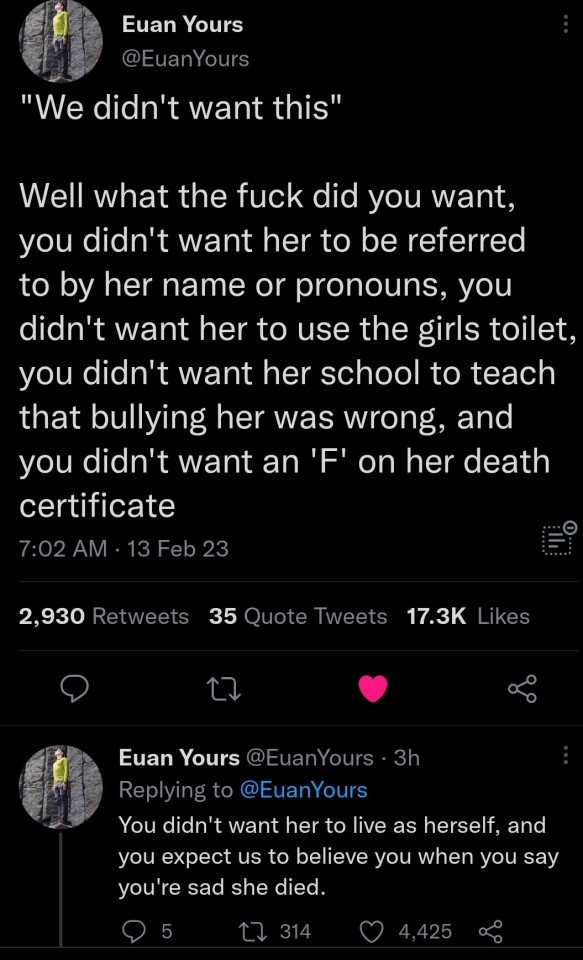
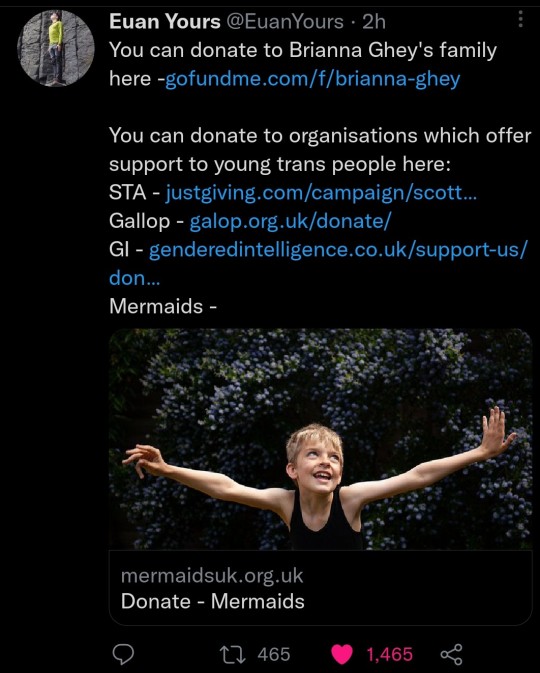
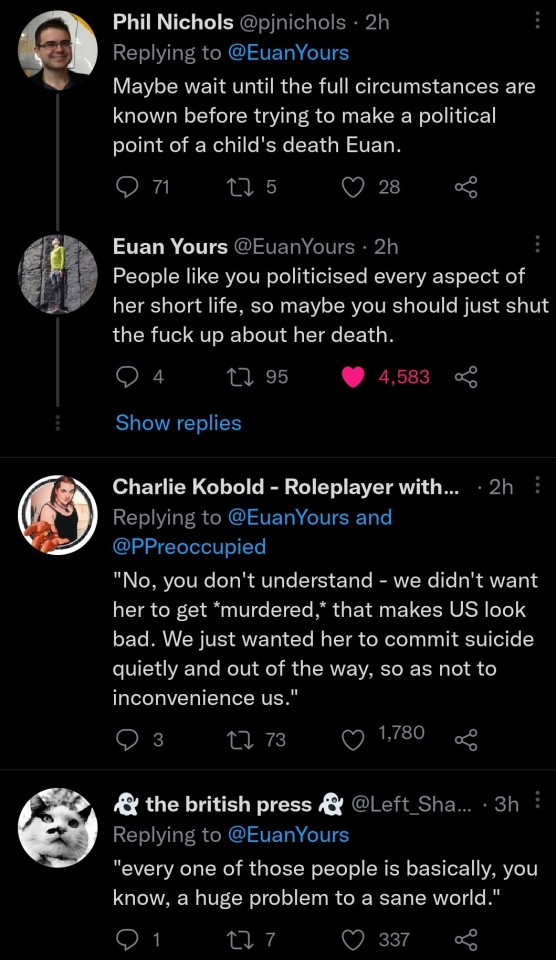

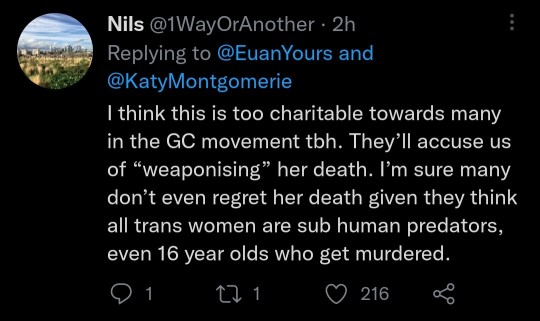
All the links to the above charities here.
Brianna Ghey's family:
STA:
Gallop:
Mermaids:
GI:
#twitter#trans rights#lgbt#tw suicide#brianna ghey#transgender#fuck the gender critical movement#pieces of shit
13K notes
·
View notes
Text
A closeted person, forcibly outed as having a trans online persona by a "conservative news site," died by suicide after being publicly ridiculed after the outing.
Then, the head of that "news site" sent condolences to Bubba's "victims and family."
There aren't any victims, of course, because the clothing you wear in private and the fiction you write isn't anybody's business, but it's important to understand that these people really do think that trans people have "victims" bc we are somehow hurting people just by existing.
Do not add any kind of transphobic or anti-closet rhetoric to this post.
Turns out there were plenty of good reasons for him to stay closeted, nu? Show his memory the same grace and gentleness you'd want shown to someone you love.
3K notes
·
View notes
Text
If I can take a moment to share my experience as a trans woman on the internet
My experience is by no means unique, it's just one experience in the plethora of trans feminine experiences and not unique to only tumblr. Though, I'll mostly talk about what I've experienced here. In the light of recent events, the reaction of "the ceo," and the comments he contributed regarding dog pile harassment; I simply wish to share my experiences that I have had to juxtapose the dynamic of his statements against a lived experience.
This account started as a way to document my social transition and eventually my journey with HRT. Tumblr had always had a large lgbtqia+ community. The queer people here inspired me and gave me hope. What I didn't know, but soon learned, is that there were people here who hated me for being trans. Being early in my transition I was a prime target. TERF groups would plan raids on my account. What this entailed was: rebloging my selfies into circles that would say the most vile things about me, threaten to kill, tell me I was ugly, tell me that everyone I knew thought I was a joke, I was a monster, my family hated me, that I should kill myself, they'd download and edit my photos into caricatures or depictions of violence. They would fill my ask box with hundreds of asks detailing how they'd kill me, call me slurs, describe the ways that I should kill myself, and pretty much everything else I mentioned above with the reblogs. Their words were carefully curated to try and break me, break my spirit, break my will to live. I tried reporting it. But it was impossible to keep up with, and like many others I saw no real response. Eventually I learned that I had to block all of them. 100's of blogs, eventually 1000's of blogs. My block list these days is incredibly extensive. I had to wade through their blogs, traverse sickening hate speech and imagery to eliminate entire circles of people harassing me. I became jaded to the hate speech, hardened to it. But mind you, I shouldn't have had to expose myself to all of this just to be at peace here amongst my community. I received no help, I was left to my own devices to protect myself. The people who hurt me never saw consequences. It was painful, it was unfair, and no one else should have to put the hours upon hours of effort and exposure to hate in to protect themselves like I did. But again my experience is not unique.
I have had to repeat this process of preemptive blocking periodically once a new circle discovers me. Blocking them all before they can start the process of hate all over again. A process of hate that seems to be hitting my community with rapidly increasing fervor as of late.
I've seen others experience far worse than me. The TERF circles will hunt down their personal information and doxx them. Expose their home address, telephone numbers, names of their family members. I can't begin to imagine the terror my queer siblings must feel when someone tells then that they want to murder them all while showing them that they know where you live. This is not a new thing, not a rare tactic, it happens. And we've all seen the news stories of trans people being murdered by people who planned it and were vocal about it.
I know this is depressing. And it doesn't reflect all of my experiences. I've had wonderful experiences here, met amazing people, made close friends, found inspiration, found hope. I found a community.
And it's my community, and I never want to let it go.
I do have fear that making this statement will get me banned. But, I wanted to say it. I wanted it to exist in the world so that everyone who doesn't know our experiences has a chance to understand and with luck empathize.
I'll part on these words and hope for the best both for myself and for every member of the community.

#transgender#transisbeautiful#trans#trans is beautiful#this is what trans looks like#okay to rebagel#trigger warning: transphobia#potentially triggering#trigger warning#trigger warning: description of harassment#trigger warning: description of violent harassment#trigger warning: description of suicide bating harassment#stay hopeful#stay strong#trans community#queer community#lgbtq community#spread love in the community and build each other up
420 notes
·
View notes
Text
About to fall asleep ramble time, this has been kicking around in my brain for a bit and I need to get some form of this thought out
I was diagnosed with ADHD and gender dysphoria one day after the other back in August. Extremely stereotypically zillenial of me, I know. Handling both of these has dramatically improved my quality of life. yes yes insert discourse about how much you need to have dysphoria as a diagnosis, it's just a tool for the medical system that's ultimately meaningless, that's not what this is about.
There's one thing that was really, really weird about the experience of getting care for both of these.
Most treatment and public talk of transition and motivations to transition are about misery. How much despair your birth sex gives you and how gender affirming care is the only stopgap against suicide (oftentimes, used as a barrier to entry that it should only be given when it's at the suicidal point). How crushing dysphoria is.
In contrast, most of the public perception of ADHD is this cutesy, "omg look I'm so quirky" kind of thing. People talk of ADHD "superpowers" and how neat it is to have hyperfixations (I'm low key starting to dislike that word, even though it's an accurate description of many things- it's very overused).
My actual experience has been almost exactly the opposite.
I absolutely had gender dysphoria, and still do, and misery associated with being AMAB. But is that what defines my trans experience? No, and in fact, it feels like a more incidental blip in it. My trans experience has mostly been defined by joy, by feeling my mind and body slowly make me more and more content with my default existence day after day. And the exploration of it all! The social roles, the romantic dynamics, the friendship dynamics, even small aesthetics like clothes and makeup, and again, the body and mood changes. It's incredible and it brings me joy so much of the time. That, more than anything, has defined my trans experience.
In contrast.... ADHD has objectively made nearly every aspect of my life more miserable. Working with my therapist and my pysch, as well as feeling what it's like to be properly medicated, have shown me extremely well how much the constant feelings of misery I always seemed to have were caused by ADHD. ADHD means being unable to receive a baseline level of dopamine to function under normal circumstances, so your brain starts looking for any way it can get new sources. And wouldn't ya know it, novel stimuli are a perfect way to do that. Keep in mind that dopamine isn't just "the pleasure molecule" it's a neurotransmitter with a broad range of functions. If you don't have ADHD, or even if you do, I want you to think about how miserable of an existence that is. Your default state is depression and inability to do things. It has been for me for most of my life. Additionally, anxieties creep into your head and distract you far more easily. You're less functional. You can't do simple things most of the time. You're distracted and have anxiety spikes easily. Continuous tasks are hard. And day in, day out... You are miserable. Almost constantly.
Oh also, you're easily addicted to extreme novel stimuli. For me, it was self harm. And when that stopped working... Well, I was in a state of mostly background depression that was only punctuated by spikes of massive, overwhelming anxiety that my brain hooked itself on. At a certain point, I just wanted it to end, by any means necessary.
It's been almost ten years since that day, and at this point I can genuinely say that I'm glad I'm still here.
But it wasn't dysphoria that did that (it contributed a bit, but still wasn't the biggest factor). Or a depressive disorder. Or bipolar. Or whatever the big, more "scary" mental illnesses or neurodivergencies are. They tried to treat me for some of them, and it ended horribly. My symptoms fit mixed presentation ADHD perfectly, including my physiological response to stimulants. They don't fit anything else. I likely don't have any strong comorbidities, unless you count the symptom-level anxiety and depression. ADHD did all of that to me. The "cute and quirky" one.
By the time I got around to a diagnosis, my pysch was astounded that I made it as far as I did with symptoms as severe as mine. Tackling ADHD has removed so much misery from my life, it's indescribable. Adderall has been the only thing that has ever actually gotten rid of my constant anxiety.
It's not fucking cute. Keeping with this being the flip side to my dysphoria, I do try to keep it light most of the time, and I join in on all of the classic "whoopsie doopsie my ADHD" trains and jokes. You don't have to stop making those, hell, they're fun. There are cute and funny parts to having ADHD, and ways it's made my personality what it is. But don't forget that this is also something that makes people genuinely suffer well beyond the "oopsie I'm such a procrastinator!!!" Type thing.
Idk where this thought is going. It's just kind of an observation that's been kicking around in my head for a bit. So uh. Hope it at least generates discussion? Feel free to add your experiences if you think it'll help you. But fuck I need to sleep lol
342 notes
·
View notes
Text
Today I’m think about how harmful and deliberate the invisibity of trans men and mascs is. In pretending we don’t exist and have never existed we are denied a community and a history. Young trans boys grow up thinking they’re completely alone contributing to the insanely high rates of suicide we have. (A study by the American Academy of Pediatrics showed that more then half of trans male teenagers have attempted suicide. Link)
Older trans men are denied healthcare especially “woman’s healthcare.” that they need and even though we have higher rates of assault then cis men and woman we are denied recourses for safety and recovery. Link
It’s so harmful and exhausting to watch this invisibility even happen in our own communities.
452 notes
·
View notes
Text
A new landmark study has found that access to gender-affirming healthcare significantly reduces rates of depression, gender dysphoria, and suicidality among transgender people.
While it’s no secret that providing gender-affirming care to transgender individuals who ask for it can greatly benefit their well-being, an increase in transphobic rhetoric and bans on gender-affirming healthcare has prompted thorough medical studies into the impact of such care.
Now, brand new research conducted in Melbourne, Australia, has found that allowing transgender people to access the care they’re after can reduce suicidality by a stunning 55%.
As part of the first-ever randomized controlled trial (RCT) on gender-affirming care, researchers took 64 transgender and gender-diverse adults who had been looking to start testosterone therapy and randomly split them into a treatment group and a control group.
While the treatment group was allowed to begin hormone therapy that week, the control group waited three months for their treatment to begin.
Before the study began, both groups were evaluated on depression, gender dysphoria, and suicidality. Three months later, the two groups were evaluated again.
RCTs for medical care can often be hard to conduct due to practical and ethical concerns. However, researchers of this study found a way to hold an RCT for this study by incorporating a shorter follow-up period. Rather than giving the control group a placebo drug, or no treatment at all, they were simply given a longer wait time.
The results showed a notable decrease in gender dysphoria, depression, and – most significantly – suicidality.
The group that received gender-affirming care right away saw a 55% reduction in suicidality compared to a 5% drop within the control group.
Depression scores in the treatment group decreased by half, while gender dysphoria rates also significantly decreased.
Breaking down their findings, researchers Brendan J. Nolan MBBS, Sav Zwickl, PhD, and Peter Locke wrote: “There was a statistically significant decrease in gender dysphoria in individuals with immediate [access to gender-affirming care] compared with delayed initiation of testosterone therapy.”
“A clinically significant decrease in depression and a decrease in suicidality also occurred with immediate testosterone therapy.”
“The findings of this trial suggest that testosterone therapy significantly decreases gender dysphoria, depression, and suicidality in transgender and gender-diverse individuals desiring testosterone therapy.”

Of course, this isn’t the first time that research has shown significant drops in depression and suicide rates among transgender individuals who receive gender-affirming care.
A 2022 medical study showed that young transgender people who have access to puberty blockers are 73% less at risk of suicide and report improved well-being.
But, as anti-trans activists advocate for further bans on gender-affirming care, one of the key arguments is that the evidence in support of the care isn’t up to scratch with GRADE (Grades of Recommendation, Assessment, Development, and Evaluation) standards.
So research like this landmark RCT is so significant to the transgender community and its allies as the fight for their healthcare rights rumbles on.
#us politics#news#pinknews#2023#gender affirming care#gender affirming healthcare#transgender healthcare#transgender#trans rights#trans healthcare#suicidality#depression#gender dysphoria#Australia#randomized controlled trial#trust the science#Brendan J. Nolan#Sav Zwickl#Peter Locke#testosterone therapy#Grades of Recommendation Assessment Development and Evaluation#lgbtqia+#lgbtqia+ rights
449 notes
·
View notes
Text
On Identity: The Truth
Content warnings: homophobia, transphobia, references to self harm and suicide.
I’ve been keeping secrets my whole life.
I’m 10 and I’m listening to my dad at the dinner table, who I know to be the most trustworthy person in the world. He talks about the legalization of marriage between two people of the same sex and asks us to consider the implications. Where do we draw the line in the sand? Legalizing gay marriage paves the way for legalizing pedophilia, after all. If a union between two men or two women isn’t disrespecting the sanctity of marriage, what’s next? Marriage between men and animals?
I’m 11 the first time I hear it: “It doesn’t matter how low I set the bar for you, you still can’t reach it.”
I’m confused and afraid—I’m trying so hard—but I hear it then, and again, and again, spoken low in disappointment, shouted with a vein popping in her forehead, cold like a fact, and it sinks in, bone deep.
I’m 12 with my first crush on a girl. I’m not confused, I know that’s what it is—I want to kiss my friend, and I already know not to talk about it. Never to talk about it. It isn’t safe.
I’m 13 and doubting. I throw myself into fitting in. I pick the right boys to like and I go overboard, and I do like them, I do, I do, I want them to like me, I want to be their friend. I want to be their equal, but that’s not quite how the story goes, so I settle for trying to hold hands with somebody I desperately crave respect from, but that’s wrong too, I learn.
I’m 14 and convicted. How could this be wrong? I brush hands with a girl in choir and we meet eyes and I know. I watch a gay kiss on TV and I sob into my hands and I tell no one, no one, no one.
I’m 15 and I come out to my mom, haltingly, with the terminology that I have, because the thought of hiding forever—keeping quiet through one more dinner—kills me.
She tells me no. She tells me I’m wrong.
I look in her eyes and I understand: it’s not an option, and it never will be.
I’m 15 and I do my best to stop there.
It doesn’t work.
I’m 16 when I first hear my mom say that you can love someone and not approve of their lifestyle. I wonder what kind of love that is. I wonder how that kind of diluted, half-hearted, patronizing love can be enough for anyone. I wonder if she’s thought about how that feels, to be told that who you are—not by choice—is fundamentally wrong.
I’m 16 and a boyfriend is a shield. The right choice, so I make it, and it’s even almost fun. I love being his friend. I’m afraid of anything more.
I’m 17 and my youngest sibling whispers, “So am I.”
My heart breaks for the pain they’ll experience, as they too are taught, painstakingly, how to hate themself. Which parts of themself have to be kept hidden, which parts are shameful. They sit at that dinner table and hear the rhetoric that pushed me to the brink and over it, and I hope they’re stronger than I am.
They aren’t.
I’m 18 and my mom works at a college for the performing arts. I sit and curdle quietly while she talks about her genderqueer students. Misgenders them behind their backs. Deadnames used flippantly. She knows better, after all. She can be the expert on somebody else’s identity. They’re mentally ill, all of them. None of them are happy. They’re searching for something only God can provide.
I’m 19 and I come out as bisexual to the man I’m certain I’m going to marry, tearing the secret out like a bandage fused to skin. He tells me of course it’s fine, that he supports who I am. Of course people like me should have rights, of course. I laugh, relieved. Later, I find out this moment was almost a dealbreaker for him, and I wonder how much was ever real.
I’m 20 and I’m out. I’m 20 and I’m free. I’m 20 and I believe, because I’ve been told, that I am loved for who I am. All of who I am. I still flinch when I hear a car door slam.
I’m 21 and I’m searching for the connection to my womanhood. I’m searching for what makes a woman a woman. I’m reading gender theory and talking to friends around the world and wondering exactly what it is that I’m missing.
What does the rest of the world know that I don’t?
I’m 22 when my marriage ends because my body might not be attractive to my husband one day, and my parents email him in support and solidarity, expressing sympathy, and I’m not surprised.
I’m 22, and standing up for who I am has cost me everything. A spouse, two sets of parents, financial security, a city’s worth of community, more childhood friends than I can count. My parents tell me to go back in the closet so my ex-husband will love me. To them, his frustration is understandable, of course—by presenting androgynously, I’m betraying my marriage vows, after all.
I wonder, stunned into silence, where I promised to look like a woman.
I’m 23 when I come out to my parents for the third time; not as bisexual, not as trans, but as hurt.
I lay out the pain of the last decade as succinctly as I can, hoping they’ll hear. When I assert that yes, to be in relationship with me, use of my name and pronouns is a requirement, my mother jokes, “Well, we don’t negotiate with terrorists.”
It’s not a joke.
I see the flash in her eyes, the instant regret as she laughs it off like it’s funny, but it isn’t.
The kid sitting at the dinner table knows it’s not a joke. The kid who listened to countless lectures on the morality of queerness knows it’s not a joke. The kid who stood with shaking hands and tried to bleed out the bad knows it’s not a joke. Years of casual bigotry taught me how to hate myself, which parts of myself I should cross out and ignore, which parts of myself I should be ashamed of.
I’m 23, and I have finally unlearned shame, and when I ask my parents to see me, the joke is that I’m a terrorist. I’m unreasonable.
The shock of it becomes a balm, later on.
Some jokes aren’t funny.
Some jokes aren’t jokes at all.
I’m 24 and I’m learning that it’s scary to be alone. Bigotry made me an orphan and made us strangers, and knowing that it’s the right choice to stand up for myself doesn’t make it any easier. I’m learning the only way out is through, if you’re not squeamish:
Cut off the part of yourself that’s 7 years old standing outside of their bedroom because the nightmare had teeth and claws and they are the heroes that will hold you close and make it warm again.
Amputate.
Cauterize.
Don’t let them see you bleed.
I’m learning that the wound takes a long, long time to close.
I’m 25 as I write this, and I am proud of who I am, even if I’m still bleeding. All of who I am. It’s taken a long time for me to let that person see the sun, but here we are, basking in the glow. Those wounds are healing. I am visible for everyone else who whispers, “So am I.”
Your sunshine will come. Your sunshine will come.
Your sunshine will come.
#long post#alex talks#tw transphobia#trans day of visibility#international transgender day of visibility#tw homophobia#tw suicide#tw self harm
224 notes
·
View notes
Text
The wrong DNA test
( what if, Sheila wasn't really Jason's mother? The system is already corrupted, then what about the test?).
A huge brawl containing every rogue had started at the time of Halloween, causing the people from downtown to fled there home's as joker had clownized the whole neighborhood with his goon's.
Every bats had taken to groups to take out the three parts of Gotham's as the rogue's had started to make alliances, some had lasted quite long while had conflicts, and causing a big damage to Arkham asylum,
It didn't take long before they captured all of them, none of the bats questions as they observed Jason glowing green eyes starting to flick, they thought it was the pit again, growing wary of the cooperation, but Crime alley was involved and that mean business to Red hood's turf.
Catherine todd love her son as her own even if not biological, Jason knew that. But her thing with drugs couldn't make her stop.
Sometimes after that, they could hear Jason humming a tune,a nice melody from Damian's statement saying that Jason muttered to him “ lullaby” as Jason continued to read his book, maybe it could be from Catherine,
they knew how Jason's past with Catherine todd, his mom even if not related, Catherine loves her son like her own kid but her doing drugs and... overdosing couldn't be stop.
Maybe Jason just remembered his mother maybe reminiscing atleast something familiar...even if it was a bad time.
Jason had constantly have been hearing a woman's? Man's? Voice, singing him a lullaby...it soothing, like as if he known and loved this melody...and that's where the dreams kept coming, there was a person, giving him kisses, Talkin to him stories, singing him lullabies and soothing him, he could dream that he was actually a baby, a baby from a normal couple, well don't count the luxurious baby room.
Jason had took out a conspiracies why he was getting this dreams, ( he swears he's not becoming Tim) and voices, maybe like a misshapen memories from the pits of victims? No it's to peaceful for that, maybe magic? He already contacted Constantine but surely hang up after knowing who it was-
Just how is he getting this dreams? Unless it wasn't.... So he proved again his point, he started a DNA test, again but none had records...of Sheila being his biological mother...that was weird, last time he had a test was from the time as robin..and before his-
So he went to that hospital who had said where Sheila had given birth to him, and most of shock is that no one knows a mother giving birth named Sheila haywood but had a document of a baby, of one Jason jay nightingale, the most believing part was that it's the same day he was born in.
His mother, Daniel F. Nightingale was said to be trans as the doctor who help his mother safely delivered him, And saying that his mother loved him,
one Sheila Haywood had the constant trick to get him and taken him as his own, because his mother's family was a wealthy one they practically sold him to her.
Jason had thought that maybe his mother's family never wanted him to have a son with a man from Gotham's crime alley.
Meanwhile Danny had just been YEETED to the DC universe before the start of Batman's justice thing and had been adopted by a very wealthy fruit loops couple as there kid, so he stayed as the couples daughter even pretending, because he owed ghost writer a favor for the last time, and as DC universe exist so it's story, and one thing for sure the child he had to give birth in this universe has a very complicated fate,
he did the one night stand from his supposed friend Willis Todd? He had to befriend him as Dalia F. nightingale the supposed Wealthy daughter who fell in love with a peasant trope, and gotten pregnant making it a scandal, and reaching to his ‘parents’ circle and getting that drama.
But he never thought he would care for his child, his little jay, his ghost side would purr in delight when they held Jason, he was a very hard sucker especially from his pacifier or his breast, it's so weird being in a women body,
but the way his ‘parents’ sold his son to the women who was supposed to get his son killed and being revived by cheap parody ass of ectoplasm.
He went feral, he had an argument to his ‘parents’ but all fell deaf ears, he couldn't find his son in one of the hotels nearby where that BXtch was.
And that time was where his part of the script was fulfilled, ghost writer already took him, both sides of his, were angry.
He. will. get. his. baby. back.
#dcxdp#Danny phantom#dcxdp crossover#Mom!Danny#Batfam#Jason todd#portraits#When the bats find this they decided to help find Jason's Mom only to find out she went missing#his Jay Nightingale now#yes- im getting of topic#so lets just say that clockwork has also has some things involved with his#dcdp#batfam#and ghostwriter#so if this doesn't go to your timeline aus or smth or cannon idk what to say#when the bats found out about Jason's investigation to find his mother#they gladly help but after finding where jason's grandparents who sold him to Haywood#they meet with them#and the whole revealed was much more depressing because His mother died/missing/suicide#Ghost writer was the one who plan the...The death scene.#so jason is sad#and very much wants his momma#because thats how ghost parents shit is right?#yeah i dont think im educated enough#So the grandparents are like grieving for there son (yes they accepted his trans btw).#and let jason and the rest of the batfam in there manor/castle ( cause there seriously old money) and introduce jason to his mom's things#portraits of danny#telling stories of danny in his youth.#but they avoided the way he ‘died’ for ghost writers plot conveniences but they mention#green...like ectoplasm but they just called it green liquid.
144 notes
·
View notes
Text
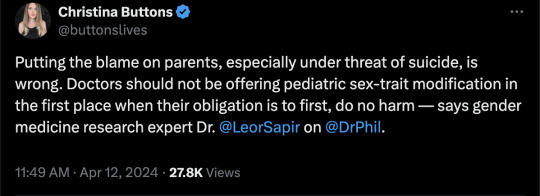
Leor Sapir: Your question is great. Framing this as a matter of choice is very American, and putting this on parents is wrong.
Doctors should not be offering this in the first place. Doctors have a moral obligation and a professional duty to first do no harm. And to put this on parents, with threats of suicide, strikes me as parental abuse by the medical establishment.
We need to stop putting this on parents, we need to stop saying, let the parents decide. We should have doctors act responsibly as medical professionals.
==
The implication is that the doctors, the ones with the medical licenses, are not the responsible one in the room, that the person proposing drastic medical action is not to be trusted, and it's entirely on the parent to perform all the gatekeeping... while being told that if they don't agree, their child will off themselves.
For longer discussion (part of the full episode), see:
youtube
#Christina Buttons#Leor Sapir#first do no harm#trans or suicide#affirm or suicide#blackmail#parental abuse#gender affirming care#gender affirming healthcare#gender affirmation#medical scandal#medical malpractice#medical corruption#ethics violation#ideological corruption#queer theory#gender ideology#gender identity ideology#intersectional feminism#religion is a mental illness
8 notes
·
View notes
Text
Here's 20 realistic reasons not to kill yourself today. Remember, anything that keeps you alive and keeps going is enough.
1. We would miss you. I would miss you.
2. Think of all the ice cream flavours you haven't tried yet, or the food combinations you haven't tried.
3. You can't discover a new favourite song if you're dead
4. Imagine all the funny moments you'd miss, all the pointless celebrity twitter fights or the niche internet drama, all the strangers tripping in the street
5. Imagine proving people wrong and going fuck you, watching all the people who doubted you be completely wrong
6. you'll never have finished decorating your room, or your wardrobe, or your collection, you'll always have something unfinished that's worth finishing
7. You'll never be able to meet your internet friends or heroes in real life
8. Imagine how many cool outfits you would miss out on wearing, how many people would think "damn that's a cool outfit" as you pass them on street
9. Your social media accounts will stay unfinished
10. What if your favourite TV show gets a second series? You'll never know how it ends
11. You'll never get to meet a potential best friend or partner
12. You'll never get to be all the fucking awesome versions of yourself you could be
13. You have games to win and arrogant people to prove wrong
14. You'll never get to watch hour favourite movie again, or realise a crucial detail that adds a whole new meaning to it
15. You never get to see the world become a better place if you're not in it.
16. You never get to try new things with your style, your hair or makeup
17. You never get to get that tattoo, or that piercing, or that really cool piece of clothing
18. think of all the debates you would miss out on winning, the feeling of pride swelling in your chest
19. You miss out on trying a new hobby or a new opportunity
20. Your pets wouldn't understand where you went.
Are these all relatively small things? Yeah. But what's important is that you see tomorrow. You give yourself one day more, go to bed and wake up tomorrow. That's what's important, not what happens in a week or a month or a year, just that you get through today and give yourself another chance.
It's okay if it takes you 10,000 'one more days' to get to 'i can't wait for tomorrow'. It's okay if the suicidal thoughts never leave as long as you wait until later and you stay alive now.
I love you. I care about you. I would miss you. Just give yourself another day.
#lgbt#finch rambles#lgbtq#lgbtqia#trans#transgender#queer positivity#trans joy#trans kids#tw suicide#suic1de#suicidal thoughts#teen mental health#actually mentally ill#mentally tired#tw vent#tw sui ideation
123 notes
·
View notes
Text






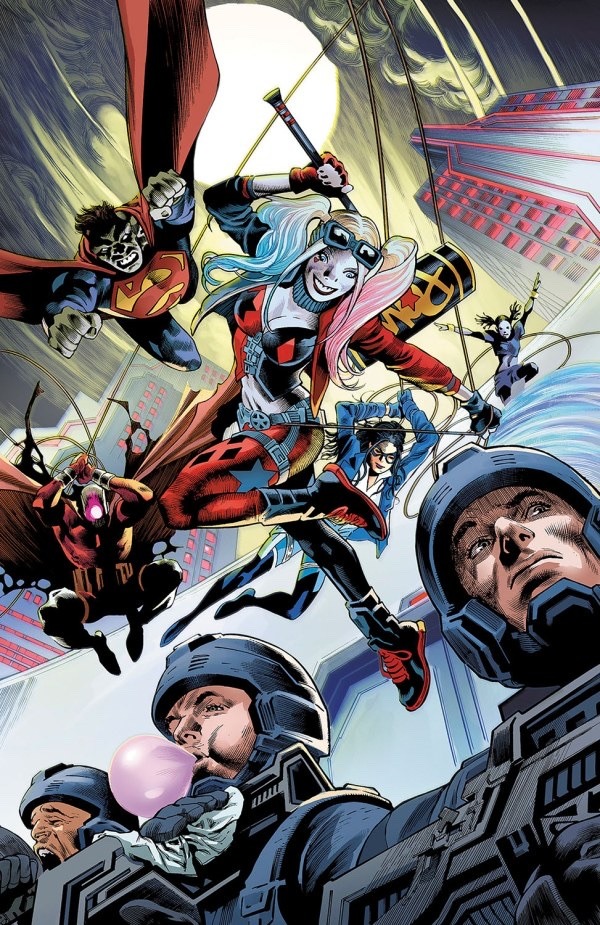



The Suicide Squad: Dream Team (2024) DC Comics
I’m happy to see Nicole Maines continue to craft a canonical comic book biography for Dreamer / Nia Nal at DC. Her role on the Supergirl TV series was groundbreaking, and it’s been fun watching her weave Nia into other mediums.
The Suicide Squad? I never thought that I’d see Dreamer forced to work for Amanda “The Wall” Waller on Task Force X. This should make for an interesting read.
#Dreamer#Nia Nal#Nicole Maines#Supergirl#DC#DC Comics#The Suicide Squad#The Suicide Squad: Dream Team#Harley Quinn#DC Heroes#DC Villains#Comics#Comic Books#Trans#Transgender#LGBTQIA+#Amanda Waller#Bizarro#Deadeye#Clock King#Black Alice#Arrowverse#Transgender Women#Task Force X#Suicide Squad
147 notes
·
View notes
Note
It's so frustrating to see people purposefully misunderstand transandrophobia/transmisandry and then very confidently talk disparagingly about the people who talk about their experiences of it and then blatantly ignore everyone going "hey yeah no that's not what that means"
Like. Devon price trying to frame it like people who talk about transandrophobia are doing so firstly because they're just ignorant misogynistic babies who want to be oppressed so bad and also to try and drive a wedge between transmascs and transfemmes is so fucking disingenuous I don't even know where to start.
We're literally just trying to talk about the experiences transmasculine people have and the institutional problems specific to us? Why is this such a fucking problem?
Its painfully obvious that the people who make these posts do not ever actually engage with the discussion of anti-transmasculinity & the wider transunitist-feminist theories. Its embarassingly obvious in this case because Devon tried to make this sick gotcha, by bringing up one of the most common topics of conversation in our spaces.
And then there's the whole "TMRAs don't realize most of what they deal with is misogyny!" take, which I've seen in other places as well. Which imo comes from the idea that people who discuss transmisandry are literally just the trans version of MRAs. & the MRA idea of "misandry" is just a reversal of their idea of feminist theory- so they use it to describe "actually society is based around women's needs and desires and it targets (cis) men and we actually live in a matriarchy!" While the transunitist concept of misandry/antimasculism is "patriarchal beliefs about men/masculinity & the roles they are expected to fulfill, used both generally to reinforce patriarcharal control and specifically to target marginalized men/perceived-masculine people." I coined antimasculism specifically to provide an alternate to misandry for those who are uncomfortable with it because of the MRA associations.
& like. whether or not you agree that these are useful words, its obvious that the transunitist idea of misandry/antimasculism is very different to the MRA one. But to know that you'd have to actually, like, read the things we write & take seriously to our theories on the patriarchy. And not just trust Tumblr Callout For Evil Trans People #3245853723 that said we don't think misogyny exists.
Also tbh I think a bigger part of this issue (transmascs who are anti-transunitist) is that its a symptom of anti-transmasculine erasure. If you don't personally experience, assault, demonization, or accusations of being a predator for being a trans man, and no one you know has either, then... you certainly aren't gonna hear about those issues from wider society. And even if you have, you might not recognize what happened as anti-transmasculine, or tell yourself it must be only a fraction of what trans women go through. & again, they don't fucking read anything we post. That's why I feel like its so important to point out & remember incidents of anti-transmasculinity (like what I do w the AoVaTP). Because its so easy to buy the "people don't violate trans men the same way" until you've read about (tw for somewhat graphic anti-transmasculine violence)
trans men getting their faces cut off, beaten with a chain, thrown out of men and women's bathrooms, hit over the head with a cooler, having their shelter at a refugee camp firebombed, having hot coffee poured in their eyes while being called a "he-she", institutionalized & tortured for not showing "proper gender behaviors" as a child, having their family burn their documents to keep them from getting a job, forced to jump from a 2nd-story window and left to die, being harassed by Fox News for being a "groomer" until their school got bomb threats, held captive and tortured for two years, found dead with their genitals stabbed, assaulted by a police officer for "lesbian activity", called "tranny" a lot, and so many rapes and so many suicides, and this is just some of the shit that I have collected for that archive.
But yeah. We're just whining about silly representation nonsense.
#sorry for bringing up all the awful shit but like. sometimes i just wanna grab these peoples faces#and be like WHILE YOU NITPICK LANGUAGE THE PATRIARCHY DOESNT STOP KILLING US#i try to pretty regularly search for news articles about trans men to keep up w anything new#and ive done a fair bit of research to find stories that NEVER!!!!! get brought up by other queer activists#wheres yalls fucking support for zahair martinez. for chriton atuhwera. for ky peterson. for ebeng mayor.#if you are an activist then put the effort in#m.#ask box#examples of transandrophobia#rape tw#suicide tw
285 notes
·
View notes
Text
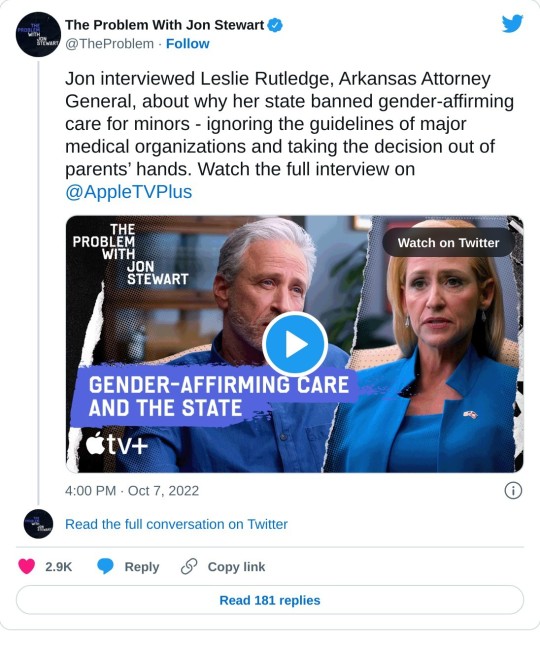
Transcript Below:
John Stewart: "Why would the state of Arkansas step in to override parents, physicians, psychiatrists, endocrinologists who have developed guidelines? Why would you override those guidelines?"
Arkansas AG Leslie Rutledge: "Well, I think it's important that [of] all of those physicians, all of those experts, for every single one of them, there's an expert that says we DON'T need to allow children to be able to take those medications. That there are many instances where—"
JS: "Right, but you know THAT'S not true. You know it's not 'For every one there's one.' There's 'These are the established medical—’”
LR: "Well, I don't know that that's not true. I don't know that YOU know that—"
JS: "Then why did you pass a law, then, if you don't? If you don't know that it's true, wouldn't you have done some—"
LR: "Well, I know that there are doctors and that we had plenty of people come and testify before our legislature who said that, uh, you know, we have 98% of the young people who have gender dysphoria, uh, that they are able to move past that and once they had the help they need, no longer suffer from gender dysphoria. 98% without, uh, that medical treatment that—"
JS: "Mhmm. Right. Wow! That's uh, that's an incredibly made-up figure. That—that doesn't comport with ANY of the studies or documentation that exists from these medical organizations. What—what medical association are you talking about of these doctors?"
LR: "Well, we have all of that in our, uh, legislative history and we'll be glad to provide that to you. Uh, I don't have the name of that off the top of my head. I know it's something that—"
JS: "You don't have the name of the organization that—?"
LR: "Off the top of my head.”
JS: "Oh, ok."
LR: "Yes. But we have all of that cited in all of our briefs."
JS: "You're suggesting that protecting children means overriding the recommendations of the American Medical Association, the American Association of Pediatrics, the Endocrine Society..."
LR: "We don't have enough data. We don't have enough to show that these drugs ARE effective and that these children ARE better off and that we should encourage these—"
JS: "'We don't have enough' or there's not enough for YOU? But, let me try and flip it a different way and see if maybe this can help... In Arkansas, if you have pediatric cancer, and obviously we all wanna protect children, I think we established that earlier, whose guidelines do you follow, for pediatric cancer?"
LR: "Well, I think if my child, who's 4, if I was faced with that terrible, uh, decision, then I would be speaking to my doctor. And if my doctor recommended something that I'd disagreed with, then I would get a second opinion and that's what I believe, that these parents need to make sure that they're encouraged to get numerous opinions when they're talking about an irreversible step in their childs—"
JS: "You're not letting them. The state's not saying 'Get another opinion,' what they're saying is, 'YOU CAN'T.' What you're actually saying is the opposite."
LR: "No, that's actually not at all what the state said. The state simply said that you cannot perform these procedures and so parents SHOULD get another opinion that they—and children SHOULD want to have another opinion, because again these are 9, 10, 11, 12 year olds."
JS: "But that's not—So, if your child is suffering from pediatric cancer and the state comes in and says to you, 'They recommend chemotherapy but we're not going to let you do that. You can't. We think you should get a different opinion and here's the organization we think you should get the opinion from. They're not the mainstream, but they're AN organization, so that's how you— that's who you have to be treated by.' Does that sound like something that you would accept?"
LR: "Well, I think that's a very extreme example. That's not at all in line with what we're talking about. We're not saying that at some point, because when you have cancer it literally is—uh, particularly pediatric cancer—and having friends that have lost children to pediatric cancer—"
JS: "Sure."
LR: "Having a 4 year old, I'm sure—"
JS: "I've got some bad news for you. Parents with children who have gender dysphoria have lost children to suicide and depression because it's acute."
LR: "They absolutely have."
JS: "And so these mainstream medical organizations have developed guidelines through peer-reviewed data and studies, and through those guidelines they've improved mental health outcomes. So, I'm confused why you follow AMA guidelines and AAP guidelines for all other health issues in Arkansas, because we checked, but not for this."
LR: "It's simply saying let those young people who are facing gender confusion and dysphoria, allow them to become adults and to make that decision. Allow a child to be a child."
JS: "So, here's where we have our—our crossroads. You've made the determination that protecting these children means not giving them access to the guidelines and care that have been designed by medical and mental health professionals for children expressing gender dysphoria and I'm asking you, again, what are your qualifications to step in and say, 'No, keeping you from that care is protecting you.' You've made that determination."
LR: "Well, these are irreversible decisions that these children at these young ages are making or that their parents are making—"
JS: "They're not making the decision. You're making it sound like a 9 year old walks into a doctor's office and says, 'Give me some testosterone.' And the doctor goes, 'Oh thank God, because we're wanting to create an army of transgenders, because we're crazy!' And they go right in, like—"
LR: "No. We passed a law to protect the children in Arkansas and I think that's what is important."
JS: "Again. The medical community disagrees with you that that's protecting children."
LR: "Well not ALL of the medical community..."
JS: "Who doesn't? Who—?"
LR: "We have had experts testify here in Arkansas."
JS: "Ok, from what medical organizations?"
LR: "Well, we have all of those in our briefs and I apologize that I wasn't prepared to have a Supreme Court argument today in front of you, but I—we are going to have arguments on this case—"
JS: "Right..."
LR: "—when the time comes."
Watch the episode, including the full interview, for free here:
#us politics#the problem with jon stewart#jon stewart#tweet#twitter#arkansas#Leslie Rutledge#AG Leslie Rutledge#transphobia#trans rights#trans#transgender rights#transgender healthcare#lgbtqia+ rights#lgbtqia+#healthcare#us healthcare#tw child death#tw suicide#pediatric cancer#american medical association#American Association of Pediatrics#endocrine society#gender dysphoria#gender dysmorphia#2022#transcript#apple tv#the war over gender#gender affirming healthcare
1K notes
·
View notes
